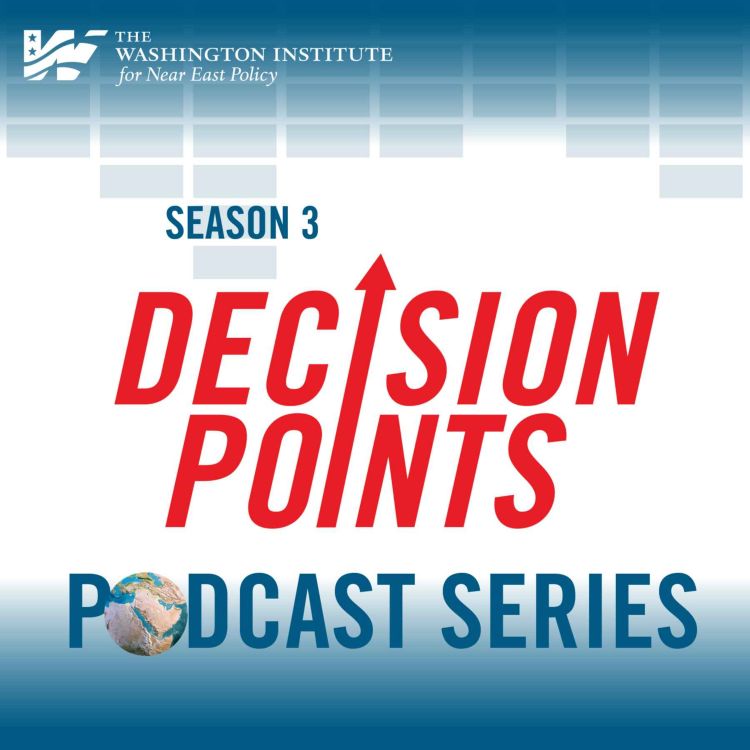Share

Decision Points
Israel's Gray Zone: Iran in Syria
Since 2015, Iranian forces have increasingly entrenched themselves in Syria as part of a broader effort to bolster the rule of Bashar al-Assad. As this effort began to unfold, Israel feared reenacting the cautionary tale of Hezbollah in Lebanon, where indecision over rooting out the Tehran-backed terrorist group proved to be a decision in itself. To avoid a situation in which Iranian or proxy forces are positioned along the entirety of Israel’s northern border, the IDF has been walking a tightrope in Syria, taking direct action against major security threats while trying to avoid a full-scale war. Can this gray zone strategy succeed in pushing Iran out of Syria or not?
To discuss this regional decision point, David Makovsky hosts distinguished guests James Jeffrey, Assaf Orion, and Oula Alrifai.
Ambassador Jeffrey served as the U.S. special representative for Syria engagement and special envoy to the Global Coalition to Defeat ISIS until November 2020. He currently chairs the Wilson Center’s Middle East Program.
General Orion is a senior fellow at Tel Aviv’s Institute for National Security Studies and the Rueven International Fellow with The Washington Institute. Previously, he served as head of the Strategic Division in the IDF General Staff’s Planning Directorate.
Alrifai, a native of Syria, is a fellow in The Washington Institute’s Program on Arab Politics, author of its recent study “In the Service of Ideology: Iran’s Religious and Socioeconomic Activities in Syria,” and executive producer of the award-winning documentary Tomorrow’s Children.
More episodes
View all episodes

11. The Judiciary Debate and the Future of Israeli Democracy
01:10:33Host David Makovsky is joined by Prof. Yedidia Stern, president of the Jewish People Policy Institute and former dean of the law faculty at Bar-Ilan University, and Justice Elyakim Rubinstein, Israel’s former attorney-general and the recently retired deputy president of its Supreme Court. After breaking down the history and structure of Israel’s judiciary, they discuss the serious implications that Justice Minister Yariv Levin’s radical reform package could have for the future of Israeli democracy.
10. Grappling with the Direction of the New Netanyahu Government
01:04:42In the season finale, David is joined by Ben Caspit, columnist and author of The Netanyahu Years, and David Horovitz, the founding editor of The Times of Israel, to discuss Israel's returning prime minister and his controversial right-wing government. David and the guests break down the keys to Binyamin Netanyahu's long-lasting political career, the evolution of his public persona, and try to understand the trajectory of the new government.
9. Combating Anti-Semitism in the Middle East and Beyond
39:48David is joined by acclaimed historian Deborah Lipstadt, appointed by President Biden as the State Department's Special Envoy for Monitoring and Combating Anti-Semitism. The two discuss the state of contemporary anti-Semitism, reflect upon the role of the Holocaust in Israel, and draw takeaways from Lipstadt's travels to the Gulf and Morocco.
8. Rabbi Kook: Founding Religious Zionism and Those Who Seek to Subvert His Legacy Today
54:49In this episode, host David Makovsky welcomes Yehudah Mirsky, professor of Near Eastern and Judaic studies at Brandeis University, faculty member of the Schusterman Center for Israel Studies, and author of Rav Kook: Mystic in a Time of Revolution. The two discuss the ideology of Rabbi Abraham Isaac Kook, founder of Religious Zionism, and how his teachings are being subverted by certain members of the modern movement.
7. Too Much History and Too Little Geography: A Conversation Across the Israeli-Palestinian Societal Divide
48:53Yossi Klein Halevi, Shalom Hartman Institute fellow and author of Letters to My Palestinian Neighbor, joins the podcast to discuss Israeli-Palestinian coexistence with Yousef Bashir, Director of Research & Operations for the S. Daniel Abraham Center for Middle East Peace and author of The Words of My Father. Halevi and Bashir share personal experiences, common public perceptions among Israelis and Palestinians, and potential steps to narrow the societal divide amid difficult times.
6. An Insider's View of the Carter White House: Negotiations with Sadat, Begin, and Assad
56:33David Makovsky hosts veteran diplomat Stuart Eizenstat, who served as Jimmy Carter’s chief domestic policy advisor and whose book President Carter: The White House Years provides an unparalleled view of the administration’s Middle East decisionmaking. In this episode, David and Stuart discuss the Camp David Accords, U.S.-led negotiations with Syria’s Hafiz al-Assad, an Egyptian-Israeli field trip to Gettysburg, and more.
5. Kissinger’s Middle East: Limiting Moscow and Starting a Road to Peace
47:12David Makovsky hosts Martin Indyk, Washington’s former peace envoy and ambassador to Israel, to discuss his recent book Master of the Game: Henry Kissinger and the Art of Middle East Diplomacy. The conversation will focus on Kissinger’s Middle East strategy from the 1973 war to the beginnings of the peace process.
4. Jabotinsky and the Birth of the Israeli Right
49:07Hillel Halkin, author of Jabotinsky: A Life, joins host David Makovsky to discuss Russian Zionist thinker Zeev Jabotinsky and the origins of the Revisionist movement, which has shaped a great deal of Israel’s political thought over the decades.
3. David Ben-Gurion: Leader of the Young State Confronts Momentous Decisions
56:59David Ben-Gurion's term as Israel's prime minister marked not only a new era for the Jewish people, but a starkly different chapter in his own life. Anita Shapira, the author of Ben-Gurion: Father of Modern Israel, joins the podcast to discuss the challenges and accomplishments of this time, from immigration and Labor party politics to German reparations and nuclearization.